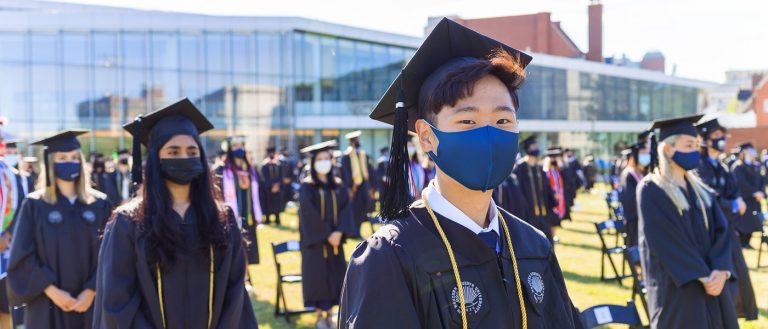After the past 14 months, the word pandemic immediately evokes COVID-19—the infection that by May 1 had taken nearly 575,000 U.S. lives—and affected 32 million in this country.
But it is only one of three we have endured, Convocation Speaker Marc Morial told Case Western Reserve graduates via recorded video posted Sunday morning.
The second is economic—11 million people left jobless, unable to pay rent or afford food. And the third—racial injustice—will be forever associated with George Floyd, murdered by a Minneapolis police officer last year on Memorial Day.
But this “trilogy of pandemics,” as Morial, current President and CEO of the National Urban League, called them, should lead not to defeat or despair, he said, but rather a ‘trilogy of tomorrow’ that has already begun.
“We’ve seen health care workers give it their all,” the former New Orleans mayor explained. “We’ve seen biomedicine in record time create a pathway beyond this pandemic is yes, the human suffering and yes the human tragedy, but also the human will, the human ingenuity, the human power of our ability to work and transition past the difficulties of this pandemic.”
Indeed, the exceptional effectiveness of COVID-19 vaccines made this year’s nine in-person diploma ceremonies possible. After ceremonies for medicine and law Sunday, May 16, on Freiberger Field, the university hosted seven more from Friday through Sunday, May 28–30. The events welcomed more than 1,700 graduates.
Morial said the other two aspects of the trilogy of tomorrow are the rapid advance and spread of technology and the ways it contributes to globalization, and our collective commitment to equity—with regard to race, gender, religion, sexual orientation.
“To build an America for the 21st century… all of us have to be committed to building a nation that’s fair, a nation that is without systemic racism, a nation which embraces its ideals,” Morial said. “If you do that—that’s success.”
This year’s undergraduate ceremonies marked the 31st that Interim President Cowen has hosted, including 14 as the dean of the Weatherhead School of Management, and 16 as president of Tulane University. Speaking Sunday, he reminded all members of the Class of 2021 of how uniquely prepared they are for the next steps in their lives.
“You all proved during the pandemic that you are strong and adaptable. Resilience emerges when we face adversity,” Cowen said. “You are going to be alright—no matter any uncertainties or setbacks you may face in your next chapter.”
Morial also was one of three honorary degree recipients; the others were paleontologist Kamoya Kimeu, a leading figure in origins science who worked closely with Maeve and Richard Leakey, and Harvey Lodish, a renowned molecular and cell biologist who was among the founders of the Whitehead Institute for Biomedical Research. Pamela B. Davis, renowned cystic fibrosis researcher and dean of the medical school from 2007 through 2020, received the Frank and Dorothy Humel Hovorka Prize, the highest honor the university can bestow on a member of the faculty.

